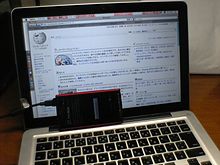- Tethering
-
For other uses, see Tether (disambiguation).
Tethering means sharing the Internet connection of an Internet-capable mobile phone with other devices. This sharing can be offered over a wireless LAN (Wi-Fi), or over Bluetooth, or by physical connection using a cable. In the case of tethering over wireless LAN, the feature may be branded as a mobile hotspot. The Internet-connected mobile phone acts as a portable router when providing tethering services to others.
Many mobile phones are equipped with software to offer tethered Internet access. The operating systems Windows Phone 7 (built-in starting from version 7.5 Mango), Android, (starting from version 2.2 Froyo) and iOS support this.[1] This feature was available before but only by 'rooting' devices and using the Linux iptables application.[2]
Tethering in carriers' contracts
Depending on the mobile phone's carrier, tethering may be provided at no extra cost. However, some carriers impose a one time charge to enable tethering, while others forbid tethering or impose added data charges, examples include T-Mobile in the UK. Often phone contracts that advertise unlimited or "all you can eat" Internet and data usage will bury these hidden charges in their terms of use.
As cited in Sprint Nextel's Terms of Service, "Except with Phone-as-Modem plans, you may not use a phone (including a Bluetooth phone) as a modem in connection with a computer, PDA, or similar device. We reserve the right to deny or terminate service without notice for any misuse or any use that adversely affects network performance."[3]
T-Mobile USA has a similar clause in its Terms & Conditions: "Unless explicitly permitted by your Data Plan, other uses, including for example, using your Device as a modem or tethering your Device to a personal computer or other hardware, are not permitted." [4]
Verizon Wireless and AT&T Mobility currently offer wired tethering to their plans for a fee, while Sprint Nextel offers a Wi-Fi connected "mobile hotspot" tethering feature at an added charge.
References
- ^ Geek.com: Android 2.2. to support tethering
- ^ http://www.androidcentral.com/android-internet-tether
- ^ "Sprint Terms & Conditions - US". sprint.com. http://shop.sprint.com/en/legal/legal_terms_privacy_popup.shtml?ECID=vanity:termsandconditions#3. Retrieved 2010-10-13.
- ^ "T-Mobile Terms & Conditions - US". t-mobile.com. http://www.t-mobile.com/Templates/Popup.aspx?PAsset=Ftr_Ftr_TermsAndConditions&print=true. Retrieved 2011-03-14.

This computer networking article is a stub. You can help Wikipedia by expanding it.

